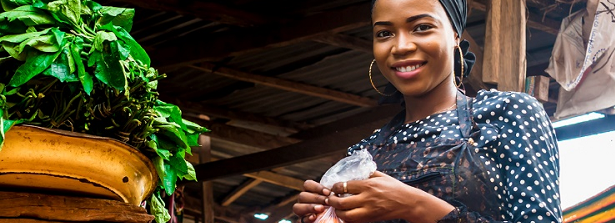Rethinking food production – Opportunities and barriers for circular agriculture

In a recent webinar, NWO-WOTRO presented key learnings on the topic of circular agriculture in light of the synthesis study that is part of the Food & Business Research Programme. The research programme, with international consortia of researchers and practitioners, focuses on food security in low and middle income countries. It contributes to innovations leading to improved products, policies and practices.
The Lunch & Learn webinar “Rethinking food production – Opportunities and barriers for circular agriculture” shared insights on the question: how can circular agriculture offer solutions to feed a growing global population?
Introduction
To kick off the webinar, Felix Bianci (WUR) provided three key insights in relation to the potential of circular agriculture, from which the Netherlands can still learn.
- Capitalize on natural processes: make use of the properties of organisms in natural ecosystems for agriculture. As an example, see this study on Acacia saligna in Ethiopia.
- Efficient use of resources: find model components that have an efficient use of resources. As an example, see this study on insect products as feed in Kenya and this study on aquaponics in Ethiopia.
- Adding value to waste: ensure smart waste for it to become valuable and an input to close the system. See this study on utilization of organic waste in Ghana.
Propositions
Next, two exciting propositions were discussed by Marcel Dicke (WUR), based on the insights from his research on insect-based feed and the perspective of academia, and Arjen Roem (Nutreco / WUR), based on his research on fish feed for circular pond systems and the private sector perspective.
Proposition 1: Insects are the circular solution to feeding the world
Marcel Dicke shared his knowledge on the opportunities insects can offer as a protein source for food and feed. At this moment, 70% of available land is used to produce animal feed, while FAO predicts that even 70% more feed for livestock is required by 2050. Insects could provide an answer. In addition, agricultural waste could be used as a new way on which you can rear new insects.
There are still challenges. There is a need to ensure legal embedding and quality standards. Equally important is the management of changes in waste value chains, increased competition and waste stream economy. To do this a two-pronged strategy is required, including a bottom up approach with farmers and local trainers as well as larger local and international businesses to take up the produced insects within feed meals.
Proposition 2: Going circular means disrupting the entire food system
Arjen Roem shared his experience based on circular pond systems. In this closed system, feed is not only meant for fish but beneficial for this tiny ecosystem as a whole. Transitions towards such circular systems benefit farmers in their efficiency and productivity, or at the very least do not decrease these outcomes. Income remains a vital aspect in the considerations for change in management. Yet, calling it disruptive to the entire food system as the proposition states might not be a entirely fair. Viewing the transition to going circular as an evolution, since it requires taking small steps, rather than viewing it as a revolution might be more fitting. To ensure success there are crucial aspects to take into account. The connection of linear systems and looking beyond the local scale are especially important. For this, the Netherlands needs a good vision and consistent policies that support long term development for all players in the food chain. A disruptive approach should not be feared, as this means being competitive and to stay ahead of the game.
Final reflections
In a final reflection, Wijnand van IJssel (senior policy advisor food security at the Ministry of Foreign Affairs) shared his three key takeaways from this webinar.
First, it will be important for policymakers and others to have courage and take circular agriculture a step forward by investing in knowledge and innovations that are developing. Second, in this effort it remains important to connect linear systems and to make them collectively circular. Third, there are a few areas of importance to further consider in improving circular agriculture efforts: e.g. legal framework, political economy, vested interest and scale levels. Finally, he concluded with highlighting the need to connect relevant stakeholders, to advance innovations and new developments.
_ _ _
This webinar is part of a series of monthly webinars organized by the Ministry of Agriculture, Nature and Food Quality, the Ministry of Foreign Affairs in collaboration with the Netherlands Food Partnership. The webinar series, hosted once per month, aims to share key knowledge and lessons learned with the relevant policymakers.





